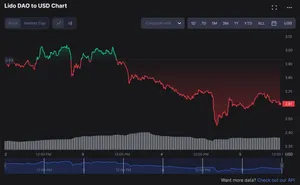Blockchain.com shutters asset management arm
New York Attorney General sues KuCoin, claims ETH is a security
The NYAG took the additional step of alleging that ETH is a security. Many have argued that Bitcoin and ETH, the native token of Ethereum, are not securities because they are "sufficiently decentralized". The NYAG, however, wrote in the press release announcing the lawsuit that, "This action is one of the first times a regulator is claiming in court that ETH, one of the largest cryptocurrencies available, is a security. The petition argues that ETH, just like LUNA and UST, is a speculative asset that relies on the efforts of third-party developers in order to provide profit to the holders of ETH."
The NYAG is also going after KuCoin for offering a lending and staking product, a category of product that has recently been a focus of various enforcement actions. They claim that KuCoin did not comply with a subpoena.
Hedera Network halts access after exploit
Hedera has not disclosed how much had been stolen. Total value locked (TVL) on the network dropped 33% from $36.1 million to $24.6 million.
Some balked at Hedera's ability to simply turn off user access to the network, despite claiming to be a decentralized project.
Turkish electric vehicle company Togg announces presale via NFT, then scraps the plan after customers have already bought in
However, shortly after the NFT sales began, the platform crashed. Then, very soon after the sale began and Togg began addressing the issues with the platform, a series of earthquakes devastated portions of Turkey. As a result, Togg announced they would be postponing the sale until a later announcement.
On March 8, Togg announced that they had canceled their plans to conduct the pre-order process by NFT drawing, and that any NFT holders would not be prioritized in the pre-order.
This infuriated some customers who had purchased AVAX solely intending to use it to obtain a pre-order slot — particularly because AVAX is now priced below $15, meaning those who've been holding AVAX since purchasing it have lost 25%.
- "Togg to sell pre-order rights with NFTs", Hurriyet Daily News
- Tweet by Togg
Gemini reportedly loses banking with JPMorgan
It's hard to say why JPMorgan might have severed ties with Gemini — it could be related to recent statements from regulatory agencies frowning on banks taking crypto companies as clients, although Coinbase noted that it continues to have an active banking relationship with JPMorgan.
JPMorgan is not Gemini's only banking partner, so despite the blow to Gemini, this will not cut them off from banking.
Silvergate bank collapses
Silvergate's collapse may worsen crypto's already tenuous relationship with US banks. Silvergate was one of the few "crypto-friendly" banks, and the clients it previously served — among them, Crypto.com, Bitstamp, and Paxos — may face challenges finding a reliable replacement.
- "Silvergate has collapsed", The Verge
- "Crypto Bank Silvergate Capital Says It Will Shut Down; Stock Plummets", The Wall Street Journal
Lido token price tanks after podcaster spreads inaccurate rumor of Wells notice
Hoffman later retracted the statement in a long tweet and apologized, and the LDO price recovered somewhat, though not to its initial level. However, he continued to claim that "there is at least one confirmed Wells Notice that has gone out recently, that isn't known to the public", but wrote that "the idea of a mass recent carpet bomb isn't correct".
WSJ alleges Tether, Bitfinex, and related companies used falsified documents to obtain banking
Among other allegations, the WSJ outlined how Tether was repeatedly denied accounts at New York's Signature Bank, and so ultimately got an executive at an aviation fuel broker called AML Global to open an account that appeared to be used to fraudulently process transactions on behalf of Tether and Bitfinex.
Tether is the largest stablecoin in circulation, though its entire existence has been marred by questions around its legitimacy and the status of its claimed reserves.
Silvergate crypto-focused bank faces crisis
On March 1, Silvergate revealed that they would miss the deadline to file their annual report with the SEC, which they blamed on regulatory inquiries. They also revealed even more losses, which added to the massive $887 million in losses they experienced in Q4 2022. They also disclosed that they were having to evaluate whether the bank was going to be able to survive.
Silvergate's stock plunged on the news, worsening its already marked decline in price over 2022–23. Some crypto firms began distancing themselves from the bank, as well: Coinbase announced on March 2 that they would no longer be transacting with Silvergate "in light of recent developments and out of an abundance of caution". Galaxy Digital, Paxos, CBOE, Gemini, Crypto.com, and Bitstamp also announced they would cease transfers to and from Silvergate, and Circle announced they would be "unwinding certain services with them".
Developers accuse Binance of stealing their hackathon idea after Binance launches similar AI NFT product
Shortly after its launch, a group of developers accused Binance of stealing an idea they had presented at a December 2022 BNB Chain hackathon. Those developers had been awarded first place and $5,000 for "Chatcasso", a nearly identical tool.
Binance has refuted the allegations of theft, with a spokesperson acknowledging the "similarities" but claiming that "Bicasso was designed and developed independently more than two weeks before the BNB hackathon".
"It's disheartening to see a company that claims to support innovation and development steal from the very people who are working hard to build the ecosystem. Who would feel safe entering a hackathon? I don't." wrote one of the developers from the team. The developer also stated that they had not signed any contracts that would have assigned the rights to their work to the company, as is the case in some hackathons.









![Tweet by BNB Chain: "The grand prize winners of our third track, Lifestyle in #Web3, is the wonderful team Chatcasso 🥇
Chatcasso is a guided platform that allows users to easily and conveniently mint NFTs using only text input through the use of AI technology.
[9/11]"](https://primary-cdn.web3isgoinggreat.com/entryImages/resized/bnb-chain-hackathon-tweet_300.webp)